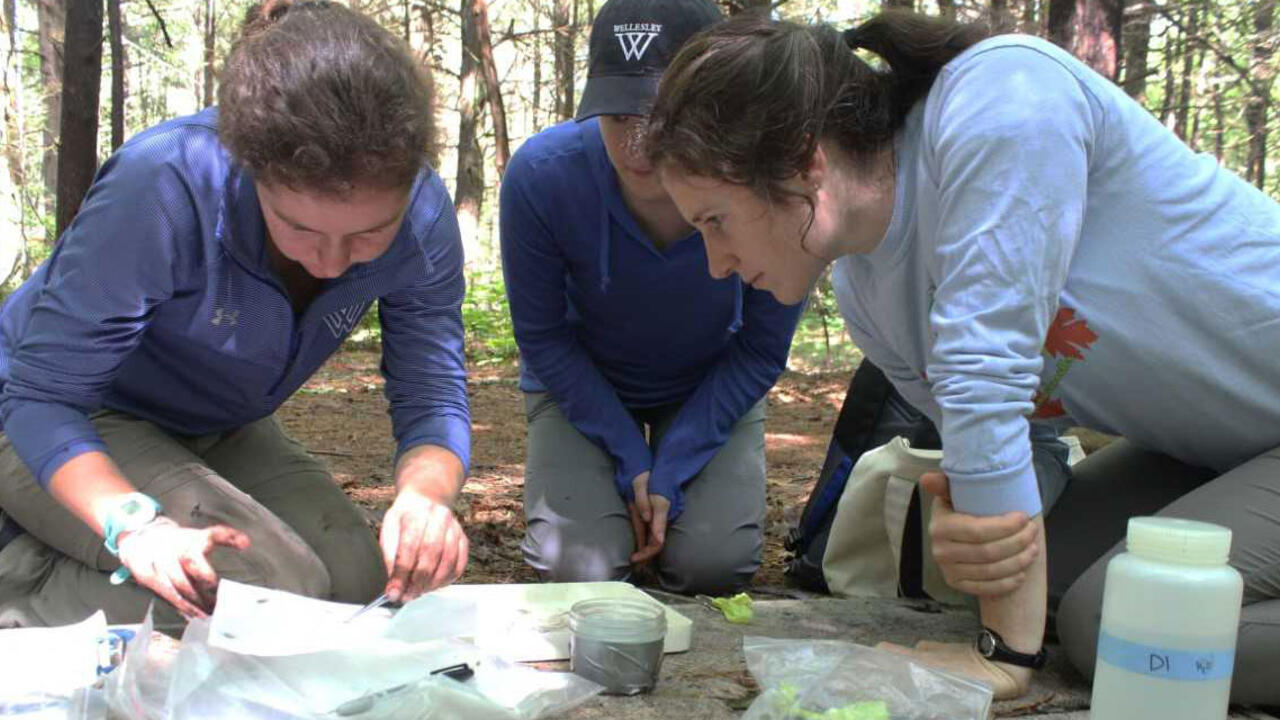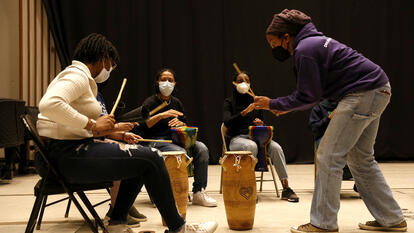Wellesley Student Uncovers the Secret Lives of Tree Roots

This summer, Eva Paradiso ’20 is digging deep into the lives, functions, and characteristics of tree roots. With the Harvard Forest Summer Research Program, Paradiso, an environmental studies major, is spending 11 weeks with scientists, mentors, and other students, exploring the effects of natural and human disturbances on forest ecosystems, including global climate change, hurricanes, forest harvest, and pests and pathogens, according to the program’s website. We asked Paradiso to share more about her research project and what she’s learned from the experience thus far.
Q: Can you describe your research in layman’s terms for us?
Eva Paradiso: I am focusing specifically on roots, looking at six different tree species in the Harvard Forest, to have a greater understanding of roots across species. The primary focus of my project is to examine root respiration, or how much roots are breathing. I am outside every day in the forest digging for roots, which are small, less than 2mm in diameter, and they can be challenging to find.
After I collect the roots, I place them into a machine that measures how much CO2 they are releasing. We are trying to better understand what happens to the carbon that is allocated belowground. Carbon allocated to roots belowground accounts for one-half of net primary productivity. Roots are an important aspect of carbon storage, but they aren’t well understood.
On top of understanding root respiration, the goal of the project is to understand tree roots generally. I am also scanning roots and running them through a program that determines their diameter, length, surface area, and volume. This research will provide a better understanding of what roots look like and how they compare across tree species.
Q: Why did you choose a research project in this area of ecology?
Paradiso: I have always loved being outdoors, and last summer I was lucky enough to do research on birds in the Hubbard Brook Experimental Forest in New Hampshire with Professor Nicholas Rodenhouse. After that experience, I became certain that I wanted to continue field research, but I wasn’t convinced that birds were what I wanted to study—in part because the job required waking up at 4:30 am six days a week.
In the fall, I took a class with Professor Alden Griffith on plants. At first, I thought that plants were tedious, but eventually I discovered that plants are really cool. In class we got to work on a group experiment that we designed, and that experience influenced what I wanted to do for the summer. I looked for research opportunities related to plants and I happened upon the position at the Harvard Forest.
I think what really sold me on this research opportunity was when I interviewed my mentor, Fiona Jevon, who is currently a PhD candidate at Dartmouth. Fiona is passionate and enthusiastic about her research and I knew that getting the chance to work with her would inspire me, and it has. Ultimately, the reason I chose to do this research was because I knew that I would be exposed to other researchers and I wanted to get to see what research opportunities are out there.
Q: How does your independent research project build on your environmental studies major at Wellesley?
Paradiso: The environmental studies major at Wellesley is incredibly interdisciplinary, which has allowed me to take many different types of classes based in policy, justice, science, and more. Throughout my major, I have discovered that I enjoy my science-based classes most, and this research is giving me the opportunity to work on science through field ecology.
This summer is allowing me to focus solely on one project, which is not an opportunity that you often have during the school year. Being able to spend 40-plus hours a week working on a project is exciting. I hope to continue working on this throughout the school year and hope to even try to publish a paper with my mentor. This opportunity is allowing me to expand my learning beyond the classroom and is helping to shape my future studies.
Q: As one of the Harvard Forest Summer Research Program’s 26 student researchers, what does this opportunity mean to you?
Paradiso: The Harvard Forest REU is a great community for young aspiring scientists. It is amazing to be surrounded by other students from across the country who are interested in ecology. One of the best parts of the program is that we are all working on different projects, so we get to learn from one another. There are people working in the greenhouses, in the lab, in the field, coding, and more.
One of my roommates is researching ants, and my other roommate is looking at silica in trees. We eat all our meals together and attend workshops and weekly seminars given by professors from all over Massachusetts. We are being exposed to life as a scientist in academia and beyond. I have learned about so many ways you can go into ecology, and I feel like the program has opened my eyes to different job paths that I can take.
Q: What have you learned from this experience that you will bring back to your studies at Wellesley?
Paradiso: The biggest takeaway that I have from the summer thus far is that things probably aren’t going to run as smoothly as you would like. The first couple weeks I struggled in the field with my machine. It worked when my mentor and I used it the first few times, but as soon as I was in the field alone I started having a bunch of issues. I spent a few days trying to fix it instead of collecting data. While this slowed down my research, I learned that research has ups and downs and issues come up that you could not anticipate. It can be frustrating, but it is part of the process and in the end, getting my machine to run properly was rewarding! Knowing that I can think critically, solve problems, and roll with the punches will help me down the road in my research and in my life.
At the Harvard Forest, Eva Paradiso ’20 (left) works with Wellesley College Assistant Professor of Biological Sciences Jaclyn Matthes (middle), and Paradiso’s mentor, Fiona Jevon (right), clipping roots in the field in order to sample them for measuring size. Paradiso is participating in an 11-week research project there for the summer.



